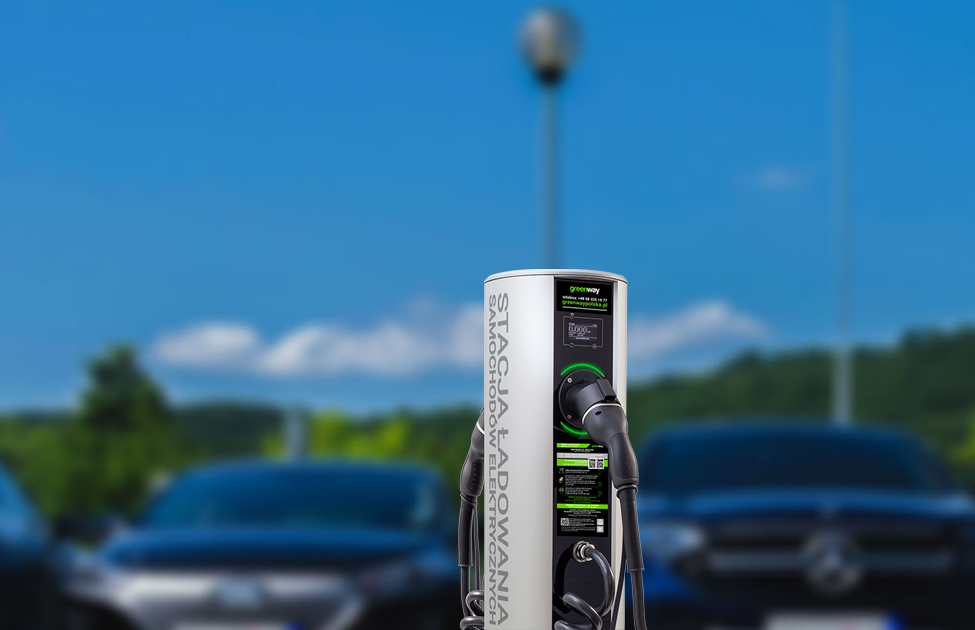Poland’s largest private delivery firm, InPost, has announced plans to build a network of charging points for electric vehicles.
InPost has already installed over 200 such points available to its drivers at logistics centres and near its parcel lockers, in cooperation with GreenWay, a firm specialising in charging stations. Now the two companies will create dozens more chargers available to the public by the end of this year.
“The expansion of the charger network at our own sites is of particular importance to us due to the decarbonisation strategy of the InPost Group,” said Sebastian Anioł, director of the firm’s logistics innovation department.
“We believe that new technologies and trends should be taken into account in the development plans of cities,” he added. “That is why, together with GreenWay, we are working on implementing a widely available network of such devices in Poland.”
Właściciel paczkomatów InPost i GreenWay do końca tego roku zbudują sieć kilkudziesięciu publicznie dostępnych punktów ładowania aut elektrycznych. InPost ma już ponad 200 ładowarek dostępnych dla swoich kierowców w centrach logistycznych i w pobliżu… https://t.co/6kBqjT6bz0
— Business Insider Polska 🇵🇱 (@BIPolska) June 16, 2023
The company, which has more than 20,000 parcel machines in Poland, has a fleet of several hundred electric vans. It notes that in 2022, nearly 30 million parcels reached their addressees via InPost’s electric vehicles.
In that year, the carbon footprint for the final mile of package delivery through InPost’s parcel lockers was 97% lower compared to direct home delivery, calculates the firm. That was up from 75% in 2021, reports technology news service Tabletowo.
GreenWay, which has over 7,000 charging stations in Poland and other central European countries, will be responsible for the installation of the InPost-branded charging stations, the construction of grid connections, and the management and technical maintenance of the stations.
Delivery firm InPost has sparked controversy by requesting that the name for its parcel lockers not be subject to the usual grammatical case endings in Polish
It holds the trademark for the word "paczkomat" but many argue the term has entered common usage https://t.co/ifANsxA7me
— Notes from Poland 🇵🇱 (@notesfrompoland) February 14, 2023
While the number of fully or partially electric vehicles registered in Poland has risen rapidly in the past two years and reached 73,695 at the end of April, it still remains well below the Polish government’s 2016 target of having one million electric vehicles on Polish roads by 2025.
The number of charging stations in Poland has reached 4,500, show data from the Polish Automotive Industry Association (PZPM) and the Polish Alternative Fuels Association (PSPA).
While the Polish government has initially declared its support for the development of electric vehicles in Poland, its programs had limited success. In 2019, after only 1,324 electric cars were registered in Poland the previous year, the government lowered its target to 600,000 electric and hybrid vehicles by 2030.
The latest European data, which cover 2021, show that Poland had one of the continent’s lowest figures for newly registered electric cars that year. The country was the only one to object to the EU’s ban on the sale of new petrol and diesel cars from 2035, saying it is too ambitious.
There are now 67,000 electric vehicles registered in Poland, 63% more than a year ago.
However, the figure remains well below government targets – which had initially envisioned one million electric cars by 2025 – and among the lowest in the EU https://t.co/c9rLWHJY5H
— Notes from Poland 🇵🇱 (@notesfrompoland) February 18, 2023

Alicja Ptak is deputy editor-in-chief of Notes from Poland and a multimedia journalist. She has written for Clean Energy Wire and The Times, and she hosts her own podcast, The Warsaw Wire, on Poland’s economy and energy sector. She previously worked for Reuters.




















